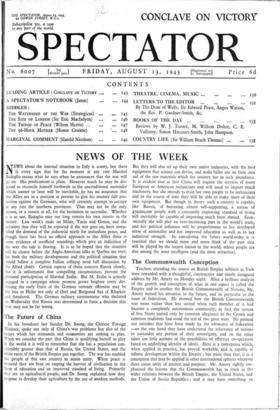The Future of China
In his broadcast last Sunday Dr. Soong, the Chinese Foreign Minister, spoke not only of China's war problems but also of the future which her statesmen and economists are seeking to plan. When we consider the part that China is qualifying herself to play in the world it is well to remember ffiat she has a population con- siderably greater than that of Russia, the United States, and the white races of the British Empire put together. The war has enabled the people of this vast country to attain unity. When peace is restored they are bent on reaping the harvest of civilisation in the form of education and an improved standard of living. Primarily they are an agricultural people, and Dr. Soong explained how they propose to develop their agriculture by the use of modern methods. But they will also set up their own native industries, with the best equipment that science can devise, and make fuller use on their own soil of the raw materials which the country has in such abundance. It is evident that at first China will require the services of many European or American technicians and will need to import much machinery, but she intends to train her own people to be technicians and in the course of time they will be able to make more of their own equipment. But though in theory such a country is capable, like Russia, of becoming almost self-supporting, a nation of 450,000,000 people with a constantly improving standard of living will inevitably be capable of importing much from abroad. Econ- omically she will play an ever-increasing part in the world's trade, and her political influence will be proportionate to her developed sense of nationality and her improved education as well as to her industrial strength. In considering the future world-order it is essential that we should more and more think of the part that will be played by the largest nation in the world, whose people are also among the most intelligent (and the most attractive).






















